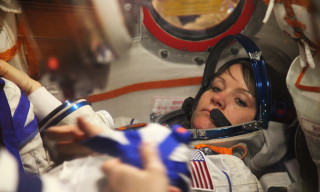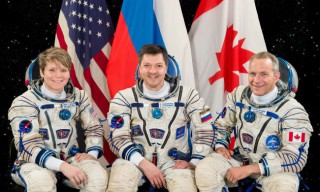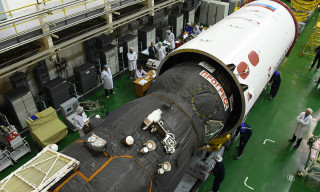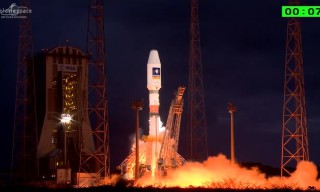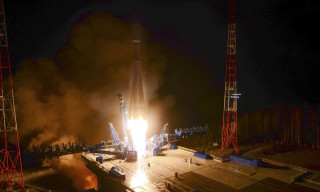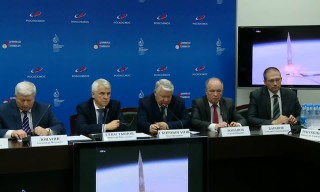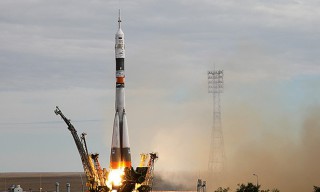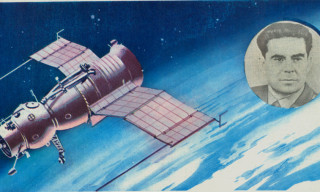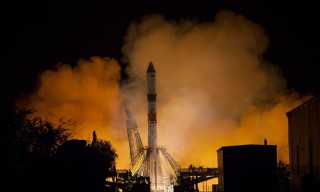-
This error message is only visible to WordPress admins
Error: API requests are being delayed. New posts will not be retrieved.
There may be an issue with the Instagram access token that you are using. Your server might also be unable to connect to Instagram at this time.
Error: API requests are being delayed for this account. New posts will not be retrieved.
There may be an issue with the Instagram access token that you are using. Your server might also be unable to connect to Instagram at this time.
Categories
- Angara (43)
- Astronomy (9)
- Baikonur Cosmodrome (519)
- Brazil (1)
- China (4)
- CrewDragon (4)
- Defenсe (47)
- ESA (119)
- Falcon (2)
- Featured article (12)
- GCTC (222)
- Guiana Space Centre (17)
- History (59)
- India (1)
- ISS (549)
- JAXA (49)
- Johnson Space Center (3)
- Khrunichev State Research and Production Space Center (63)
- Mars (8)
- MCC (85)
- Moon (21)
- NASA (206)
- Plesetsk Cosmodrome (84)
- Progress (232)
- Proton (137)
- Roscosmos (645)
- ROSS (4)
- RSC Energia (94)
- Russia (754)
- Satellites (232)
- Science (137)
- Soyuz (550)
- Space (472)
- Spacewalk (72)
- SpaceX (6)
- Star city (67)
- Starliner (7)
- Tourism (27)
- USA (72)
- USSR (1)
- Vostochny Cosmodrome (69)
- Zero Gravity (12)
Category : Soyuz
November 21, 2018
At the Baikonur cosmodrome the final stage of preparation of the crews of the 58/59 long expedition to the International Space Station began (main crew - Roskosmos cosmonaut Oleg Kononenko, CSA astronaut David Saint-Jacques and NASA astronaut Anne McClain and the backup crew -Roscosmos cosmonaut Alexander Skvortsov, ESA astronaut Luca Parmitano and NASA astronaut Andrew Morgan). During the pre-launch training, the crews underwent general training on safety measures and checked their suits for tightness. Today in the Testing Training Complex of the GCTC at the 17th site of the cosmodrome will be held the flag-raising ceremony of the participating countries of the "Soyuz MS-11" launch program.
full storyNovember 20, 2018
Yesterday morning, on November 19, after the farewell ceremonial of the main and backup crews of the ISS-58/59 in Star City, the cosmonauts and astronauts went to the Chkalovsky airfield near Moscow, from where they flew to Kazakhstan by two special aircrafts to complete the final pre-launch preparation at the Baikonur cosmodrome. Today, the crews will conduct the first "fitting" of the "Soyuz MS-11" spacecraft, which is scheduled to start on December 3, 2018. The main crew of the ISS-58/59 includes: Roskosmos cosmonaut Oleg Kononenko, CSA astronaut David Saint-Jacques and NASA astronaut Anne McClain.
full storyNovember 16, 2018
On November 15 at 10 am (Moscow time) in the GCTC a meeting of the Interdepartmental Commission began, which summarized the readiness for space flight of the main and backup crews of the ISS-58/59. The main and backup crews of the "Soyuz MS-11" spacecraft reported on their readiness to carry out the flight program, thanked the GCTC specialists and other organizations for their good preparation. According to the commission, the crews of the 58/59 long-term expedition to the International Space Station are ready to perform a space flight on the "Soyuz MS-11" spacecraft and the Russian ISS segment and recommended to begin preparations at the Baikonur cosmodrome .
full storyNovember 13, 2018
At the Baikonur cosmodrome, preparations are continuing for the launches of the "Soyuz MS-11" manned spacecraft and the "Progress MS-10" cargo spacecraft. During the preparation of the "Soyuz MS-11" spacecraft, the inspection of the ship’s systems and compartments for leak tightness in a vacuum chamber using helium-air conditions was successfully completed. The launch of the "Soyuz MS-11" spacecraft is scheduled for December 3, 2018. Also at Baikonur cosmodrome the RSC "Energia" specialists conducted a design inspection of the "Progress MS-10" cargo ship and carried out technological operations on rolling the head fairing of the launch vehicle. The launch of the "Progress MS-10" cargo vehicle by the "Soyuz-FG" carrier rocket from the Baikonur cosmodrome is scheduled for November 16, 2018 from the launch complex № 1 (Gagarinsky start).
full storyNovember 7, 2018
On November 7, 2018, at 03:47 Moscow time, the launch vehicle "Soyuz-ST-B" with the European meteorological spacecraft "MetOp-С" was launched from the cosmodrome of the Guiana Space Center. "MetOp-C" is the third and last satellite of the European Satellite Meteorology Organization. The first and second satellites of this series were launched in 2006 and 2012 respectively.
full storyNovember 6, 2018
On Saturday, November 3, at 11:17 pm Moscow time, at the Plesetsk State Test Space Center in the Arkhangelsk Region was successfully launched the "Soyuz-2.1B" mid-range space rocket with the Russian "Glonass-M" navigation satellite. The launch of the carrier rocket and the launching of the spacecraft into the calculated orbit took place in the normal mode. From the beginning of the year, launches of the "Soyuz-2.1V" and "Rokot" light-carrier rocket and the "Soyuz-2.1B" middle class have also been successfully launched from the northern cosmodrome. The "Glonass-M" space unit, launched into orbit, has replenished the orbital grouping of the Russian Glonass Global Navigation Satellite System and is at the stage of entry into the system.
full storyNovember 1, 2018
A press conference was held at the Mission Control Center at TSNIIIMASH on the results of the work of the State Commission to determine the causes of the emergency situation, that occurred on October 11, 2018 during the launch of the "Soyuz-FG" launch vehicle with the "Soyuz MS-10" spacecraft. The reason for abnormal separation is the failure to open the lid of the nozzle cover of the oxidizer tank of the “D” block due to the deformation of the splitting contact sensor stem (bending by 6˚45 ‘) allowed during assembling at the Baikonur cosmodrome. t the same time, the State Commission approved the launch dates for the International Space Station program: on November 16, 2018, the "Soyuz-FG" launch vehicle with the "Progress MS-10" cargo spacecraft will be launched, and on December 3, 2018, "Soyuz MS-11" spacecraft will be launched .
full storyOctober 31, 2018
According to the information from TASS News Agency, the cause of the "Soyuz-FG" rocket accident, that occurred on October 11, was the abnormal operation of the sensor, signaling the separation of the first and second stages of the carrier. This was announced on Wednesday by Sergey Krikalev - the executive director of Roscosmos for manned programs. The "Soyuz-FG" launch vehicle with the "Soyuz MS-10" spacecraft crashed on October 11, shortly after launching from Baikonur.
full storyOctober 26, 2018
50 years ago, on October 26, 1968, cosmonaut Georgy Beregovoi successfully launched a spacecraft "Soyuz" into orbit, opening the way for new generation ships to space. The beginning of the history of the “Soyuz” was not triumphant - three unmanned launches were unsuccessful It was an experimental flight, the cosmonaut Beregovoi had to work out the docking, however, the program could not be fully completed. But the main thing - the launch and landing of the new ship were successful!
full storyOctober 25, 2018
On October 25 at 03.15 Moscow time Russian Aerospace Forces operational crew successfully launched Soyuz -2.1b booster with Russian Ministry of Defense satellite from Plesetsk launchsite located in Arkhalgelsk region.
full storyPages :




